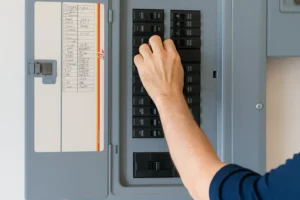When the power is out during a storm or blackout, many homeowners wonder if they should I turn off the circuit breakers. If you’ve ever experienced a partial power loss (maybe electricity not working in one room or power out in one room) this is especially relevant. The short answer: yes, it can be smart, depending on the situation. Let’s dig into why you might do that, when you shouldn’t, and common “how to fix power outage in one room” tips.
What Happens If You Leave Breakers On?
If you leave breakers on while the power is out, especially during severe conditions (storms, wind, ice), your home is vulnerable to power surges once electricity comes back. These surges can damage sensitive electronics like computers, TVs, smart home devices. Also, if a line outside is damaged, restoration could bring unstable voltage. Turning breakers off helps protect your home’s wiring and devices.
When You Should Turn Off Breakers
- During an extended outage: If electricity is not working in one room or many rooms, shutting off non-essential breakers prevents demand spikes when power returns.
- If your home uses a generator or backup power setup: isolating circuits avoids dangerous backfeeding.
- If you see sparks, smell burning, or suspect water intrusion: shutting off relevant breakers stops further damage.
When You Might Leave Some Breakers On
- You may want to keep one lighting circuit active so you know when power comes back on or to maintain visibility at night.
- Leave essential circuits like refrigerator, medical devices, or security alarms powered (if safe to do so).
- Make sure any breaker left on is for equipment capable of handling outage conditions.
Power Went Out in One Room and Then Came Back On
If power went out in one room and then came back on, that’s often a sign of an intermittent issue: loose wires, overloaded circuit, or failing device. Maybe a breaker tripped temporarily under load (say, some appliance turned on), then reset itself. Or GFCI protection could play a role. If it keeps happening, it’s a warning. Inspect wiring, outlets, and consult an electrician. Leaving that issue unresolved can lead to bigger failures or fire risk.
Power Is Out in One Room But the Breaker Isn’t Tripped
This is one of the trickiest scenarios. You have no electricity in one room, but when you inspect the breaker panel, nothing looks tripped. Some possible reasons:
- Faulty outlet or switch in that room is worn or broken
- Loose connection or wire inside the wall or in a junction box
- GFCI circuit protecting that room has tripped somewhere else in the house
- Breaker itself could be failing internally even if the handle looks “on”
In cases like this, test outlets, reset GFCIs, unplug high-draw devices, and if needed, call a professional to trace wiring.
Common Questions & Best Practices
Is turning off all breakers necessary? If outage is expected to last long or you anticipate surges when power returns, yes, except for essential circuits.
Will flipping breakers damage them? Occasionally flipping breakers rapidly can wear them or stress contacts. Use care.
How long should breakers stay off during an outage? Usually until power is stable and your electrician or utility confirms the grid is safe.
If your power outage is short and neighborhood-wide, you might leave breakers alone. If it’s extended, during storms, or you’re dealing with lights in one room not working or electricity not working in one room, turning off non-essential breakers protects your electronics and wiring.
We recommend planning ahead by labeling your breaker panel, knowing your essential circuits, and having surge protection installed. If you have repeated partial outages or odd quirks like power going out in one room unexpectedly, reach out for a diagnostic inspection. We provide electrician services to homes and businesses in Vancouver, Ridgefield, Portland, and all surrounding areas.


